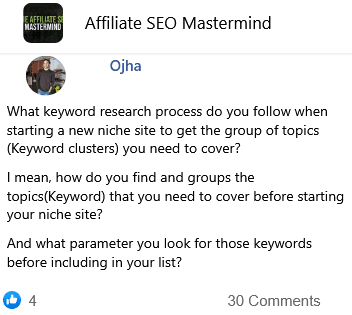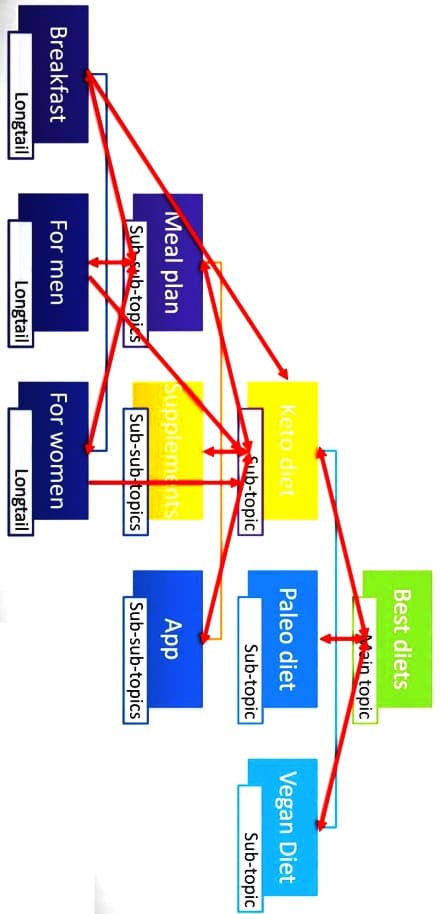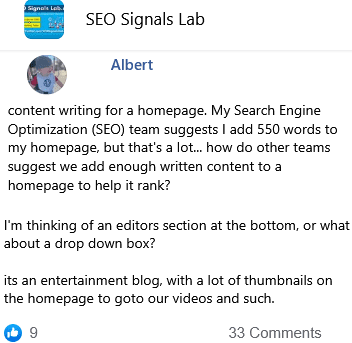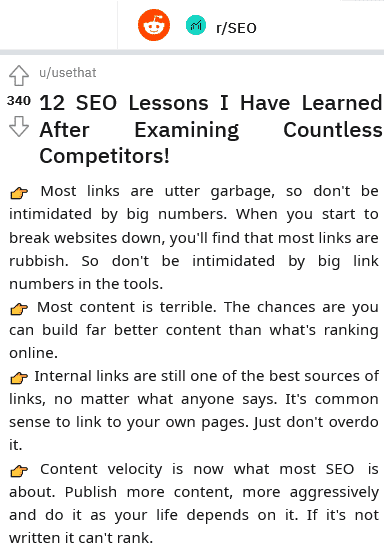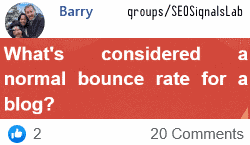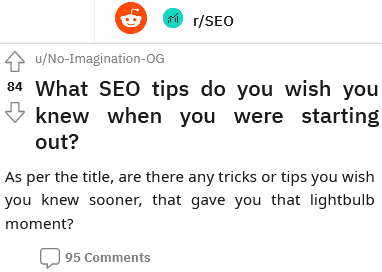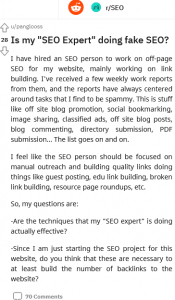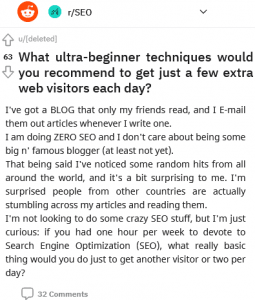What keyword research process do you follow when starting a new niche site to get the group of topics (Keyword clusters) you need to cover?
I mean, how do you find and groups the topics(Keyword) that you need to cover before starting your niche site?
And what parameter you look for those keywords before including in your list?
4 👍🏽4
30 💬🗨
📰👈
What keyword research process do you follow when starting a new niche site to get the group of topics (Keyword clusters) you need to cover?
Group according to search intent.
I mean, how do you find and groups the topics(Keyword) that you need to cover before starting your niche site?
Follow keyword research and keyword clustering process to develop the content map and information architecture of the website.
And what parameter you look for those keywords before including in your list?
Topical relevance to the search intent.
Imagine I gave you a bucket of Lego pieces and told you to organize them by color, shape and size.
You need to do the same with keywords, just you're sorting them by their search intent and topical relevance to each other, not their color, shape and size as you would with a bucket of Lego pieces.
💟👍🏽8
Yes agree, and what tools do you use for this process? Ahrefs?
Dolman » Ojha
Whatever tool you want to find keywords + whichever tool you want to use to cluster and group keywords + whichever tools you want to use to map out the information architecture and content hierarchy of each group.
I have used and can recommend ahrefs, StoryBase and Keyword Chef as tools to build a keyword list and Keyword Cupid, Excel/Google Sheets and Whimisical/Mind Meister as tools to cluster and group keywords into a content map which forms the information architecture of the website and organizes the search patterns into pages, topics, sub-topics, and the subsequent content briefs needed to mirror the underlying search intent.
💟👍🏽3
Ojha ✍️
Awesome Jason
Wish someone can make a video on this.
I was trying Keyword chef (affordable) but I guess it is limited to US only.
I will figure out from here
Dolman » Ojha
I have a couple of videos posted on my profile you can review. I don't go through the whole process of grouping and organizing all of the keywords, but they should help guide you in the right direction.
Otherwise, Keyword Cupid is a great tool and Lefteris Soulas has a bunch of videos and tutorials to illustrate how it works to cluster and organize a list of keywords.
🤔💟👍🏽7
Ojha ✍️
I had seen the videos, but I think I need to watch them again.
📰👈
Despina
My process is similar to what Dolman mentioned. I use Ahrefs with a mix of seed keywords I check in bulk and also keywords competitors rank for. I make sure I cover all aspects of the niche while ensuring my keywords are as relevant to affiliate content as possible. Then Keyword cupid works it's magic for clusters.
You need to apply some strategy to which clusters end up as pages and which end up as sections.
Usually I would add each page to Google sheets in a content plan along with an SEO brief from a tool like POP/Surfer/Fraser or marketmuse. ATM I use a combo of Frase in advance since it gives writers an idea of subheadings etc and pop after content is published to ensure on page implementation is good.
With some simple scripts/ automations, the data in each row of content plan is auto added to a new Google doc that serves as a content brief for my writers. I also have a Google sheets to template that automatically pushes content through the pipeline from writers to editors, designers etc. So after the strategy is done, the rest is hands off for me until final on page checks are needed.
Re keyword parameters, for affiliate site I start by filtering for money content. Keywords including 'best, review, vs' good place to start. Then, depending on the niche, I also look for specific types of info opportunities too with keywords including e.g. recipes, ideas, how to or any indication of a question
I also use exclusion parameters for words like price, deals, coupons etc and sometimes for competitor or retailer names like Costco, Amazon, Walmart etc.
💟👍🏽7
That's fantastic. So Ahrefs, Cupid is go to tools to start with?
Despina » Ojha
Yeah these two alone can get you from niche idea to content plan ready to implement 🙂
Edward » Despina
Have you tested keyword Cupid against any other tools like cluster Artificial Intelligence (AI) or surfers content planner?
Despina » Edward
No intensive kind of testing yet though I can keep you posted when I get around to testing 🙂
So far, I've seen examples of the outputs of cluster ai and surfer, it seemed to me you get less data about each cluster when compared to KC. I also know the logic behind them are quite different. KC doesn't just match up keywords if they only share three of the same listings on page one, it goes MUCH deeper than that.
Not sure about surfers price per keyword clustered but Cluster AI and KC have a similar price point when you buy credits.
Also, the owner of KC, Lefteris Soulas support is top notch and I recommend trying out KC on this point alone!
Edward
Looks like we will be giving keyword Cupid a try!
Despina » Edward
Totally worth it, there's a decent amount of free credits for you to get a fair assessment of the capabilities too 🙂
Phillips » Despina
Thanks for sharing this. Does Keyword Difficulty (KD) play a role in building your content plan? Or do you try to cover the entire niche topically so that Google sees you as an authority? If the latter, how do you know when you have covered the niche completely? Also where does link building factor into your process here?
Despina » Phillips
Great questions!
I use a custom metric to gather the priority of each keyword. It helps the non-SEO users on my team to see what's more important without having to understand all the data points.
Essentially, keywords with more search volume, lower KD and higher click through rates are prioritised the highest and then there's a sliding scale from there.
After clustering everything, we get the weighted priority per page. So in a way, yes I use Keyword Difficulty (KD), but only in this sense so my team can easily decide which pages to publish when.
I also target a stack of low volume keywords and questions to fill in topic gaps and these tend to have low KD too. So we look at these opportunities for quick wins while working on medium to long term goals in the background.
Publishing velocity and filling topic gaps is the first part of what we focus on. Once we catch up, we then shift content budget to links. In that time a lot of our content tends to gather natural links anyway so we have industry data to replicate a natural link velocity.
Otherwise we analyse the top competitor's link velocity and go from there.
As for how we know if we've covered the niche – it all starts with our research and strategy. I leave no stone unturned at all.
I gather all related keywords for all silos and the top entities that the website should focus on (eg for ecommerce I'll research all the brands, products and model numbers until there's nothing that I haven't explored.)
I also have a proprietary process I've built to reverse engineer topics from competitors or other info sources online. If we're hitting all the things people look for AND all the things we need to be saying so Google categorises us correctly, there's really not much left.
Some niches can go into more detail on a topic beyond this and books are the best place to find such details e.g. textbooks. But if no one is looking and no one is publishing it online, that's where we draw the line.
Honestly, at this point we are still often publishing hundreds if not thousands of articles about a topic. We really don't need more content for Search Engine Optimization (SEO) when we finish implementing the initial plan. The only variable is how fast the project budget allows us to get there. So for most clients with lower budgets, we just keep plugging away for 6-9 months on as much content as possible. Then ease into adding links if needed. If month 1 and 2 content is ranking on page 1 by month 6, we prioritise more content instead.
I hope this answered all your questions 😊
Matt Diggity 👑
The Recursive Keyword research process, based on reverse engineering the ENTIRE niche and assigning and clustering topically related keywords together.
💟👍🏽8
📰👈
An SEO Case Study on My Reverse Content Post Clustering
How do Keyword Planners actually work?
Google uses Natural Language Processing (NLP) instead of Latent Semantic Indexing (LSI) due to Both Different Patent Owners
Definitions of Search Intent and Definitions of Entities and Utilisation of Both
SEO Is Easy! The Exact Process We Use to Scale Our Client own SEO From 0 to 200K Monthly Traffic and Beyond
AMA Case Study: Amazon Affiliate Website From $267 to $21,853 per Month in 19 Months
Recommended Number of Words for an Article to Beat the Competition in Search Engine Result Pages SERPs
Each Inner Page You Wrote Needs at Least a Backlink
